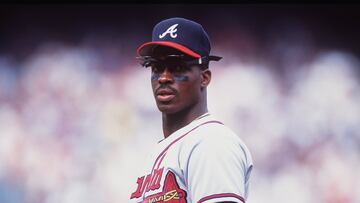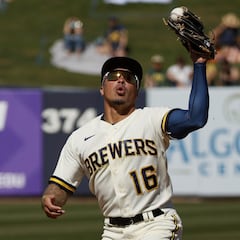Why did only Fred McGriff get sent to the MLB Hall of Fame and nobody else?
Atlanta Braves World Series winner Fred McGriff was unanimously voted into Cooperstown, but nobody else on the ballot made the cut.


The Contemporary Baseball Era Committee unanimously elected Fred McGriff to the Hall of Fame on Sunday. McGriff had a wonderful seventeen-year MLB career that included a World Series ring with the Atlanta Braves in 1995. He finished his career with 493 home runs and a .284/.377/.509 slash line with an .886 OPS.
This secondary route to Cooperstown offers players who fall short in the traditional manner a second bite at the apple. There are lessons to be learned with this vote, however.
Fred McGriff is headed to Cooperstown! He’s been elected to the @baseballhall by the Contemporary Baseball Era Players Committee. pic.twitter.com/I9cmJ8SlXL
— MLB (@MLB) December 5, 2022
How are players elected to the Hall of Fame?
The traditional route to the Hall of Fame is that a player becomes eligible five years after they have retired, and will remain on the ballot for a maximum of ten years. To become elected, a player must be named on over 75% of ballots cast, whereas players who appear on fewer than 5% of ballots is dropped.
The problem is who votes for these players. The votes are cast by the Baseball Writers Association of America. Journos, people like me, decide who is a Hall of Fame player.
I played baseball all of my life. I played from Little League to a Division III college. I moved to Europe and played in Britain, winning the national championship with the Croydon Pirates both as a player and as a manager. I know my way around the game.
But I am in no way qualified to decide who is worthy of Cooperstown membership. That right belongs to MLB players alone. The voting should be decided by members of the Hall of Fame and the MLBPA, and nobody else. Perhaps coaches. No owners. No gurus. And definitely no journalists.
Fred McGriff had a storied career. Now, the Crime Dog is off to the @baseballhall! pic.twitter.com/oAbytrL5NG
— MLB (@MLB) December 5, 2022
The Contemporary Baseball Era Committee is perhaps the best example of this. The committee is made up of six Hall of Famers: Greg Maddux, Jack Morris, Ryne Sandberg, Lee Smith, Frank Thomas, and Alan Trammell. It also included ten non-players including owners, historians, and media executives. Even if all of the players want one of their peers in the Hall, it would take the cooperation of most of the executives to make it happen. Whereas the executive members could elect someone with only two players consenting.
Fred McGriff elected to Hall of Fame. Unanimously.
The players under consideration in 2022 were:
- Fred McGriff
- Barry Bonds
- Roger Clemens
- Curt Schilling
- Don Mattingly
- Dale Murphy
- Rafael Palmeiro
- Albert Belle
Welcome to Cooperstown, Fred McGriff! https://t.co/SD7Qt6xei4 pic.twitter.com/KBrT6mVUJ4
— National Baseball Hall of Fame and Museum ⚾ (@baseballhall) December 5, 2022
The election of Fred McGriff presents us with an issue. Understand please that I am not saying that Fred McGriff is not a Hall of Famer. He was as exciting a hitter as any that I have ever seen. As I said earlier, however, whether he is or is not a Hall of Famer is not my place to say. The vote was unanimous, meaning that all of the former players voted for him, so if they think that he is a Hall of Fame player, then who am I to argue?
The problem is this: if McGriff is a Hall of Famer, then why aren’t some of the others?
Don Mattingly got eight votes, Curt Schilling got seven, and Dale Murphy got six. Now, it is not possible to know who voted for whom, unless the members themselves go public with their own ballot. But there is the possibility, in each of these cases, that the players voted in the same way and were over ruled by the execs. And that would lay bare the tragedy of it all.
There are those who would point to stats, saying that Don Mattingly and Dale Murphy, while dominant for a short time, simply did not play long enough to deserve Hall of Fame membership. Hogwash.
Addie Joss played for only nine years and is in the Hall of Fame. Joe “Iron Man” McGinnity, Amos Rusie, Ross Youngs, Ralph Kiner, Jackie Robinson, and Roy Campanella all played for only ten years. Both Mattingly and Murphy had longer careers than this.
Their years of dominance were short, to be sure, but so was Sandy Koufax’s. It isn’t how long you do great things. It is how great those things were.
Congratulations to Fred McGriff 👏
— MLB Network (@MLBNetwork) December 5, 2022
The newly-elected Hall of Famer joined us on #MLBTonight after learning he was headed to the @baseballhall! pic.twitter.com/iih7VvVf8v
Beyond durability, there is an argument made that these players simply didn’t put up the numbers necessary. Fred McGriff hit 99 home runs more than Dale Murphy, for example. But McGriff also put up ten less than Gary Sheffield, and Sheffield isn’t in the Hall of Fame. So it can’t just be pure numbers.
This is the problem when you have non-players voting on Hall of Fame membership. They feel that membership has to be quantified. And sometimes there is no way to quantify greatness.
Is Bonds a Hall of Famer? What about Clemens? Many argue that the PEDs make it difficult to add them in. Then why not Schilling? Is it because of his grating personality? By all accounts Ty Cobb was a horrible person to be around. But he is still in the Hall of Fame.
Related stories
If it to have any meaning whatsoever, the Hall of Fame has got to be about something more than a simple popularity contest.
But then again, who am I? Go ask some former MLB players for their opinion.

